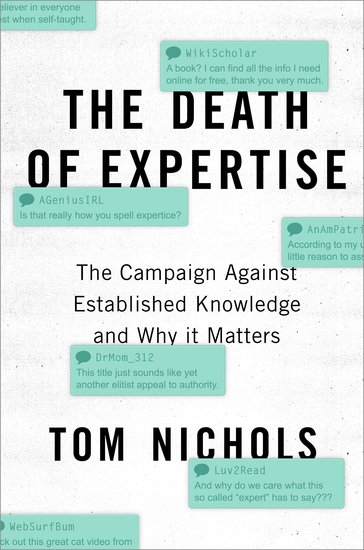 This review first ran in the April 10 edition of The Hamilton Spectator.
This review first ran in the April 10 edition of The Hamilton Spectator.
The Death of Expertise: The Campaign Against Established Knowledge and Why it Matters
By Tom Nichols
Oxford University Press
$27.50
We get to watch the death of expertise play itself out in real time with Hamilton’s light rail transit project.
Despite what experts tell us about the downtown renewing, sewer and sidewalk replacing and city-building benefits of our billion dollar infrastructure project, not everyone’s a believer. City council appears divided and public support seems underwhelming nine years into the project. We shouldn’t bank on another study, report, op-ed or endorsement by experts, elites and the professional class to win over skeptics and silence critics.
“While expertise isn’t dead, it’s in trouble,” says Tom Nichols, author of The Death of Expertise, a professor at the US Naval War College and five-time undefeated Jeopardy! champion
“Something is going terribly wrong. It’s not just that people don’t know a lot about science or politics or geography; they don’t but that’s an old problem. The bigger problem is that we’re proud of not knowing things.”
We’re sliding from uninformed to misinformed and aggressively wrong, warns Nichols. Feelings now matter more than facts. Our guesses are as good as anyone else’s, even if we know little or nothing about the matter at hand.
Nichols believes we’ve adopted a new Declaration of Independence. “No longer do we hold these truths to be self-evident. We hold all truths to be self-evident, even the ones that aren’t true. All things are knowable and every opinion on any subject is as good as any other.”
A toxic confluence of arrogance, narcissism and cynicism is being levelled with self-righteous fury at experts and professionals and that should concern us all says Nicols. “When resentful laypeople demand that all marks of achievement, including expertise, be levelled and equalized in the name of democracy and fairness there is no hope for either democracy or fairness.”
What’s put expertise in a death spiral? Nichols pins blame on the Internet, higher education and the media.
We’re less social and more confrontational online. We cluster in echo chambers and associate only with people who share and confirm our view of the world. The vitriol on comment sections and discussion boards proves we can’t tolerate challenges to our beliefs and ideas.
And who needs experts when we all hold advanced degrees from the University of Google?
“In the various skirmishes in the campaign against established knowledge, the Internet is like artillery support: a constant bombardment of random, disconnected information that rains down on experts and ordinary citizens alike, deafening all of us while blowing up attempts at reasonable discussion.”
Nichols gives colleges and universities a failing grade when it comes to developing critical thinking skills in students. “Higher education is supposed to cure us of the false belief that everyone is as smart as everyone else. They are failing to provide the ability to recognize expertise and to engage productively with experts and other professionals in daily life. Students are learning that emotion and volume can always defeat reason and substance, thus building about themselves fortresses that no future teacher, expert or intellectual will ever be able to breach. When students learn that emotion trumps everything else, it is a lesson they will take with them for the rest of their lives.”
Much of the news media has devolved into partisan infotainment and personality journalism with its focus on form over content, says Nichols. Instead of giving us what we need, the media is giving us the clickbait and hot takes that we seem to crave. And what we want most from our news is confirmation instead of information. “Much of what passes for news in the 21st century often leaves laypeople – and sometimes experts – even more confused and ornery.”
Nichols says experts aren’t doing themselves any favours when they wander into the prediction business or make the dangerous assumption that they’re smarter at everything because they’re smarter at a few things. Nichols says experts should instead stay in their lane, resist the urge to offer up opinions and stick to explaining rather than predicting.
The Death of Expertise is a sobering read and you don’t have to look very hard to find evidence of it happening close to home. All of us need to wander out of our echo chambers and safe spaces, start varying our news diets and reminding ourselves daily that we’re not as smart as everyone else.
@jayrobb serves as director of communications for Mohawk College, lives in Hamilton and has reviewed business books for the Hamilton Spectator since 1999.